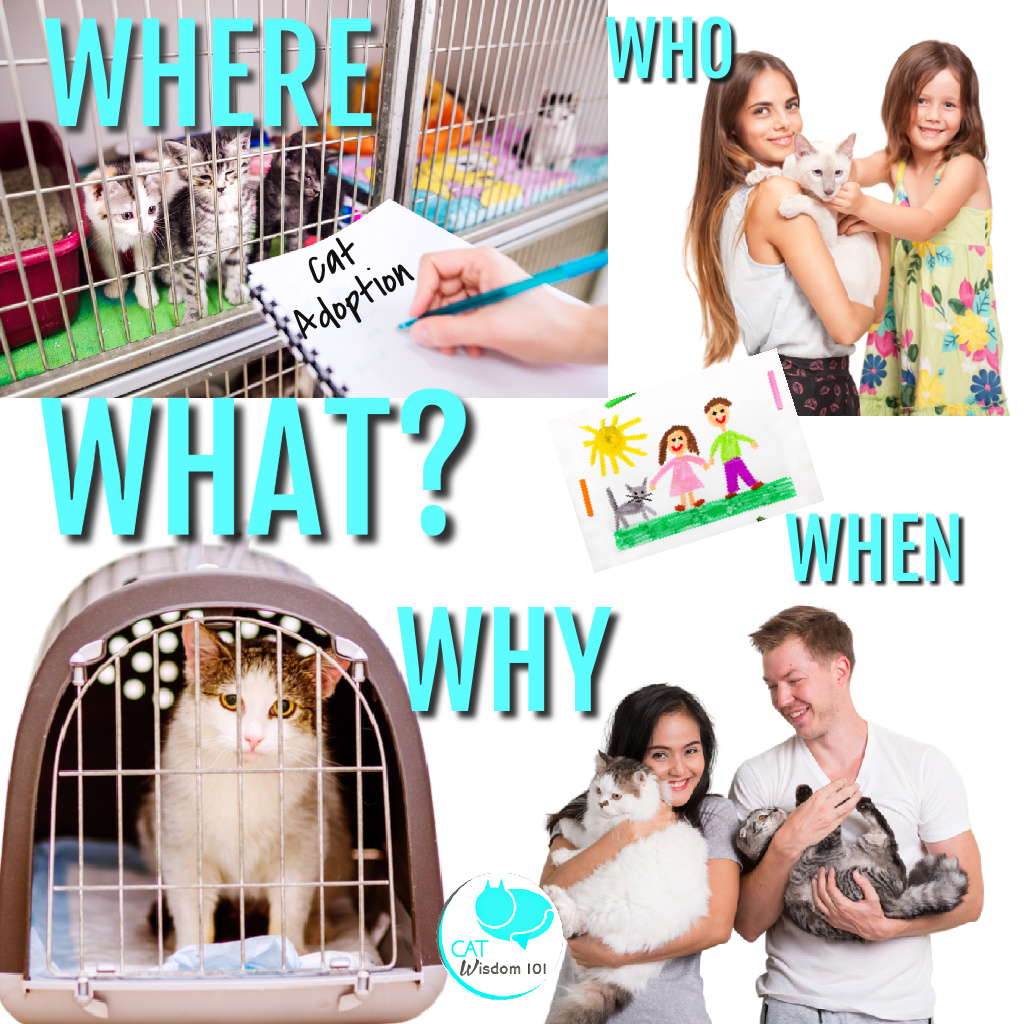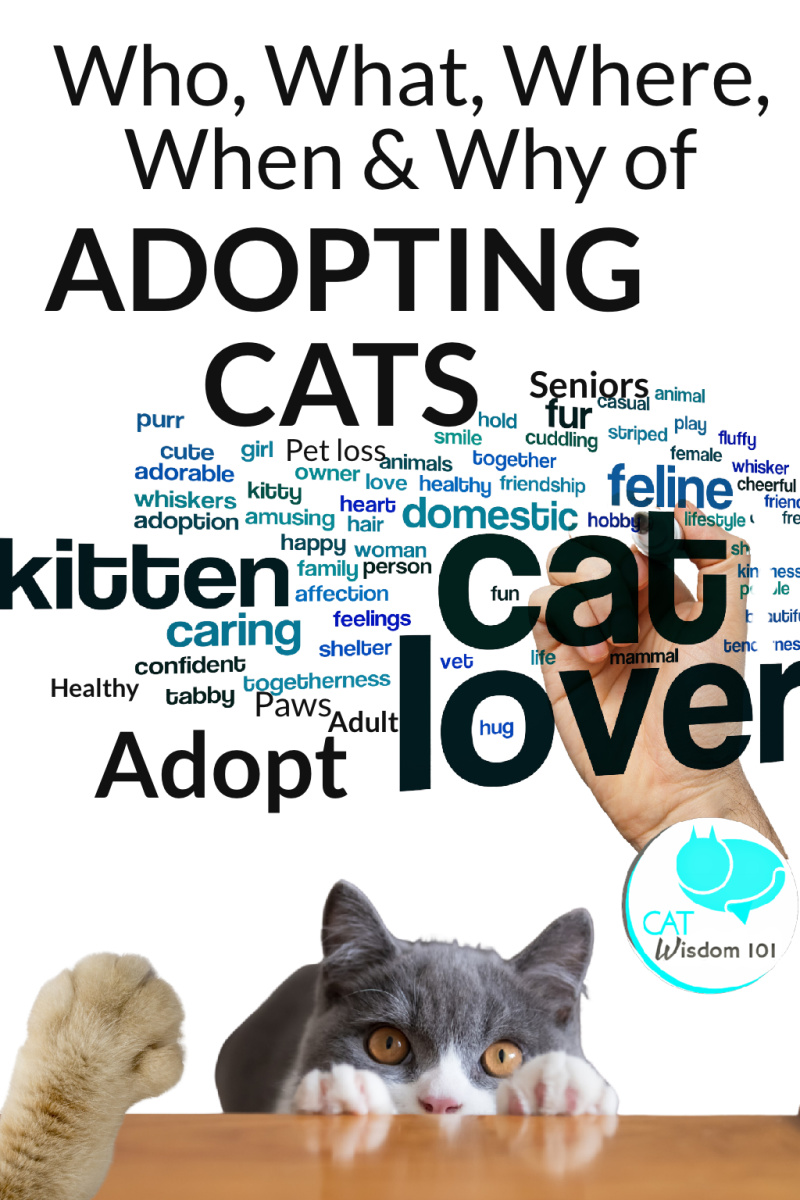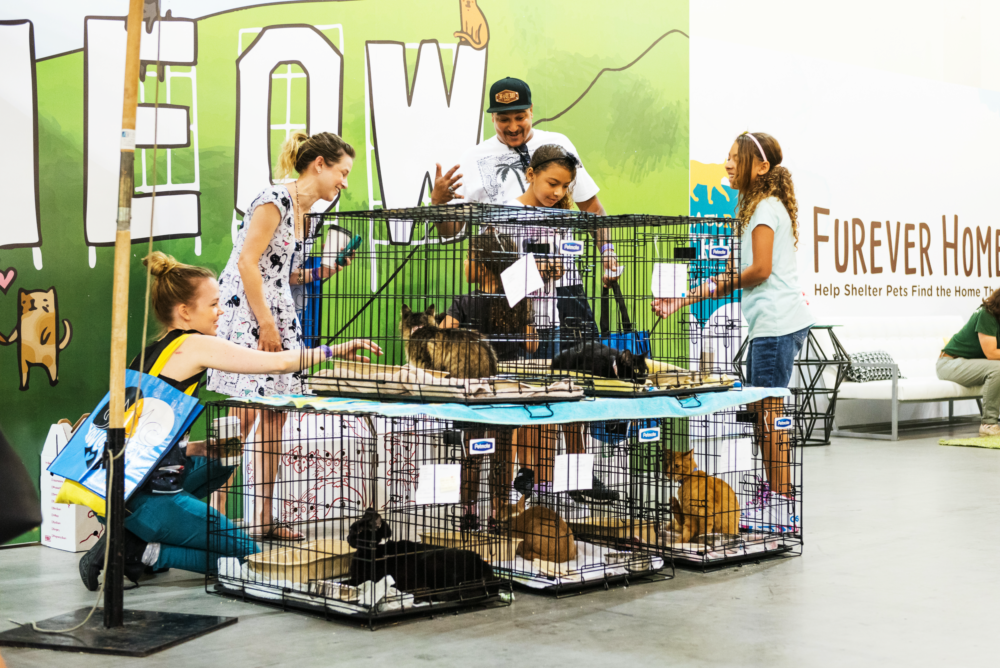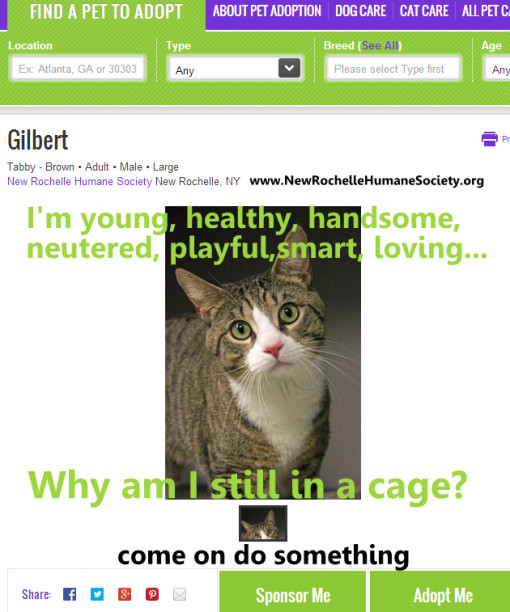
Cat Adoption: Who, What, When, Where & Why
Cat Adoption: Who, What, When, Where, Why or W5 by Layla Morgan Wilde
t a If there is something I missed, please leave a comment.

Adopting Shelter Cats: W5 for First-Time and Experienced Cat Owners
1. WHO:
Who should consider adopting shelter cats? Shelter cats are suitable for individuals and families of all ages looking for a loving companion. Both first-time and experienced cat owners can benefit from adopting shelter cats. First-time owners may find shelter cats to be more adaptable and grateful for a forever home, while experienced owners can provide a nurturing environment for cats with various needs.
2. WHAT:
What should potential adopters know about shelter cats? Shelter cats come from various backgrounds and have unique personalities. They may require some extra patience and understanding during the adjustment period. It’s important to spend time interacting with potential adoptees to gauge compatibility and ensure the cat’s needs align with your lifestyle.
3.WHEN
When is the right time to adopt a shelter cat? As in all things: timing is everything. The timing of adopting a shelter cat depends on your personal circumstances. Ensure that you have the necessary time and resources to provide proper care, including regular veterinary check-ups, feeding, grooming, and playtime. Consider factors like work schedule, family commitments, and any upcoming major life changes before bringing a cat into your home. Extra thought is required prior to vacation or holiday season, getting married, divorce, pregnancy, new baby, empty nest, retirement, illness or death. It’s increasingly common to adopt another pet soon after the death of a pet. This is a very personal choice but don’t feel a rush to adopt again.
4. WHERE
Where to find shelter cats for adoption? Local animal shelters, rescue organizations, and adoption centers are excellent places to find shelter cats. They often have a wide variety of cats of different ages, breeds, and temperaments available for adoption. Research and visit multiple shelters and rescue groups to find the right match for you and your home. If you are insistent on a pedigreed cat, consider a specific breed rescue group or carefully research ethical cat breeders.
5. WHY
Why adopt a shelter cat? There are probably as many reasons as there are cats Adopting a shelter cat saves a life and gives a second chance to a deserving feline companion. These cats often have limited options and may have experienced neglect or abandonment. By adopting, you contribute to reducing overcrowding in shelters and promoting animal welfare.

Other Whys:
- Emotional well-being: Cats provide companionship and emotional support, helping to reduce feelings of loneliness and stress. Interacting with a cat can boost mood and decrease anxiety, promoting a sense of calm and relaxation.
- Mental stimulation: Owning a cat can provide mental stimulation and engagement. Playing with and observing your cat’s behavior can be entertaining and mentally stimulating, which can enhance cognitive function and prevent mental decline.
- Stress reduction: Petting a cat has been shown to lower stress levels and release endorphins, which are the body’s natural mood-boosting hormones. The rhythmic motion of stroking a cat can have a soothing effect and help alleviate stress and tension.
- Heart health: Studies suggest that owning a cat can have a positive impact on cardiovascular health. Cat owners tend to have lower blood pressure and a reduced risk of heart disease and stroke compared to those without pets.
- Allergy prevention in children: Growing up with cats, especially from an early age, can help reduce the risk of developing allergies and asthma in children. Exposure to cat allergens during early childhood can potentially strengthen the immune system and lower the likelihood of allergic reactions later in life.
- Improved sleep quality: Some may beg to differ but I’ve always loved sleeping with cats. Having a cat as a sleep companion can promote better sleep quality. Cats’ rhythmic purring and gentle presence can provide a sense of comfort and security, helping individuals fall asleep faster and enjoy more restful sleep.
- Exercise and physical activity: Maybe not as vigorous as walking and playing with dogs BUT playing with a cat, especially with interactive toys, can encourage physical activity for both children and adults. Engaging in playful activities with your cat, such as using a laser pointer or tossing toys, promotes movement and exercise, which is beneficial for overall health and well-being.
- Social connections: Cats can act as social catalysts, facilitating connections with other people ie. Instagram. Taking your cat for walks or participating in cat-related events can provide opportunities to meet fellow cat lovers and create new social bonds.
Remember, adopting a cat comes with responsibilities and a commitment to their care. Ensure you have the time, resources, and willingness to provide a loving and nurturing environment for your feline companion.
The bond you develop with your cat can positively impact your health and bring joy and companionship to your life FOR LIFE.
That means a commitment for 20+ years if adopting a kitten or young adult.
If you’re not sure or quite ready, consider fostering.
- Prepare your home by providing a safe and comfortable space, including a litter box, scratching posts, toys, and hiding spots.
- Consult with shelter staff or volunteers about a cat’s medical history, behavior, and any special needs they may have.
- Gradually introduce the cat to your home and establish a routine to ease their transition.
- Be patient and allow the cat to adjust at their own pace. Give them time and space to explore and become comfortable in their new surroundings.
- Consider adopting an older cat, as they often have a more settled temperament and require less intensive care compared to kittens.
- Schedule a visit to the veterinarian shortly after adoption to ensure the cat’s overall health and discuss any necessary vaccinations or treatments.
One last tip: Let go of your expectations. You may have your heart set on on certain kind of cat but maybe the best one is the UNEXPECTED one.









13 Comments
Meezer'sMews&TerrieristicalWoofs
Our first cat was from a rehoming situation, and after a few weeks he became a fun and loving meezers…still missed so much even after all the years that have gone by since he changed to an an angel…and we had five more after him…one a rescue, (Who became a special needs kitty), and four from home breeders…(before I realized there were breed specific rescues)…
Layla Morgan Wilde
Thanks for sharing your mix of rescue situations.
Maggie
Thank you for this thoughtful and well researched post. We realize that our three boys are our last cats, which is a bitter sweet thought. But fostering and continuing to support our shelter is a happy option.
Layla Morgan Wilde
Thanks Maggie and I agree it’s bittersweet to realize the finite relationship.
meowmeowmans
Great post, Layla. Adopting a cat will change your life — and that of the kitty you adopt. Amazing how that works, right? 🙂
Cat and Dog Chat With Caren
Layla this post was FANTASTIC!! This should be posted in EVERY SHELTER IN THE COUNTRY!!!
Layla Morgan Wilde
Thanks so much Caren xoxo
Layla Wilde
Thanks for sharing. Agreed when possible to adopt from a rehoming situation before surrender to a shelter, as long as the cat is vetted. The good thing about most shelters, all intakes are fully vetted before adoption.
Erin the cat
Ultimately, the choice as to whether you do or not is yours. But as our lives are not really our own, if we can, I do think we should. After all, good acts, acts of kindness and compassion to other sentient beings, garners positives for ourselves, usually far more than the simple action.
Layla
It’s true. Since the advent of social media, there is an influence to adopt before someone is ready.
Brian Frum
Adoption and a happy life mean the world to the receiving kitty, or puppy. We just love giving the kitties a happy life.
Layla Wilde
Yes! It’s a intrinsic joy.
Connie Marie Poulson
I’ve adopted from the local shelters here when they had a high number of euthanasia. They have now changed to almost no kill. The cats I now have either were rescues or given to me by people who knew I was good with cats. People wanting a cat now I would recommend getting from a shelter, they vet them better, people and cats for suitability and temperament because there are people who had been adopting for use as bait in dog fighting, awful isn’t that. I couldn’t stand to get another dog after losing my last one in 2004 but I don’t want to ever live without a cat. They understand me, don’t judge and respect me as well. In fact when my oldest died in October I was afraid they would get depressed, it turned out that they looked after me! Each one taking on a habit of his.
So if I was to look for another I would adopt from a family that for whatever reasons they couldn’t keep theirs, it’s expensive to turn them into the shelter and then some people just kick them out. I have in the past fed those poor cats who were so scared I couldn’t get close enough but at least they didn’t starve!